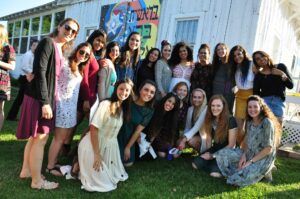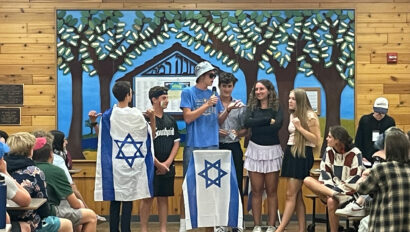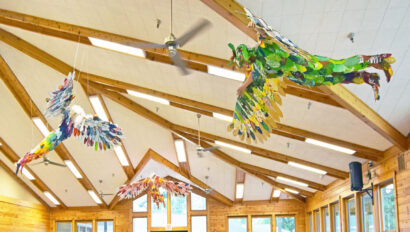By Shlomit Fuchs, Hebrew teacher *Scroll down to read this post in Hebrew*
This summer I feel that I brought Israel to camp just by being myself. Beyond the stories about the army I told, beyond the pictures of my family that I showed to the campers, beyond the conversations and Israel activities with campers, my Israel is simply who I am. The slang in Hebrew, the words that come to me without thinking when I am surprised or happy – are my Israel. The stories about my family – an ordinary Israeli religious family in an ordinary Israeli community – are Israel to me. I hope that the way in which my campers see me and know me as an individual helped them to better understand Israel and the “regular people” who live there.
Camp Ramah helped me to think a lot about my Jewish identity. Jewish identity, in my opinion, is a developing thing that always grows and changes. In my two months at camp I did a lot of thinking, asking myself and my friends some important questions and getting some answers. Not many answers, and that’s a good thing.
The prayers, more than anything, were meaningful to me. As a woman who also prays outside of camp, to be part of daily prayer services, to experience the challenge of helping campers who are not used to praying – to be part of the prayer – challenged me every day to think about the meaning of the prayers for me and the way I want prayer to be part of my Jewish identity.
A significant moment I had at camp was on July 4th. In general, this day, the experience of American culture intensively throughout the day was very interesting. But my story is related to Hebrew. During the carnival I competed with a few of my Bogrim students in the Carnival race. After long negotiations, I managed to convince them to compete against me, and the rule was that if I won, they would have to speak Hebrew throughout the next day. I lost, of course. They are much faster than me. But I felt that I had given them a point to think about their Hebrew and about learning Hebrew at camp. They understood, or so I felt at least, that I did not come to camp to teach just because it’s my job, but that speaking Hebrew was something deeper than language, something worth fighting for in the race. I hope they understood that Hebrew can actually be one of their connections to their Jewish identity.
אני מרגישה שהבאתי את ישראל למחנה בזה שהייתי אני. מעבר לסיפורים על הצבא שסיפרתי, מעבר לתמונות מהבית שהראיתי לחניכים, מעבר לשיחות ולפעולות על ישראל שהיו לחניכים – ישראל שלי היא פשוט מי שאני. הסלנג בעברית, המילים שנפלטות לי בלי לחשוב כשאני מופתעת או שמחה – הם ישראל שלי. הסיפורים על המשפחה שלי – משפחה ישראלית דתית רגילה ביישוב ישראלי רגיל – הם ישראל בעיניי. אני מקווה שהצורה שבה החניכים שלי רואים אותי ומכירים אותי כאדם יחיד עזרה להם גם להבין טוב יותר את ישראל ואת ה”סתם אנשים” שחיים בה.
המחנה עזר לי לחשוב הרבה על הזהות היהודית שלי. זהות יהודית, לדעתי, היא דבר מתפתח שתמיד גדל ומשתנה. בחודשיים שלי כאן בעיקר הספקתי המון לחשוב, לשאול את עצמי ואת החברים שאיתי כאן שאלות וגם לקבל קצת תשובות. לא הרבה תשובות, וטוב שכך.
התפילות, יותר מהכל, היו משמעותיות לי. כאישה שמתפללת גם מחוץ למחנה, להיות חלק מתפילות שיווניות באופן יומיומי, לחוות את האתגר שבלעזור לחניכים שלא רגילים להתפלל – להיות ממש חלק מהתפילה, איתגר אותי כל יום לחשוב על המשמעות של התפילות בשבילי ועל הצורה שבה אני רוצה שהתפילות יהיו חלק מהזהות היהודית שלי.
רגע משמעותי שהיה לי במחנה היה ב4 ביולי. בכלל, היום הזה, החוויה של התרבות האמריקאית בצורה אינטנסיבית לאורך יום שלם היו מאוד מעניינים. אבל הסיפור שלי קשור דווקא לעברית. במהלך הקרנבל אחרי הצהריים התחריתי מול כמה תלמידים מהכיתה שלי מעדת הבוגרים במירוץ המכשולים שהיה בקרנבל. אחרי משא ומתן ארוך הצלחתי לשכנע אותם להתחרות מולי, והחוקים היו שאם אני מנצחת אותם – הם יהיו חייבים לדבר עברית לאורך כל היום הבא. הפסדתי, כמובן.. הם הרבה יותר מהירים ממני. אבל הרגשתי שנתתי להם נקודה למחשבה על העברית שלהם ועל לימוד העברית במחנה בכלל. הם הבינו, או ככה הרגשתי לפחות, שאני לא באה ללמד והולכת כי זה המקצוע שלי, אלא שהעברית שהם מדברים היא מבחינתי משהו עמוק יותר משפה, משהו ששווה להתחרות בשבילו במירוץ, היא בעצם הקשר שלהם לזהות היהודית שלהם.






